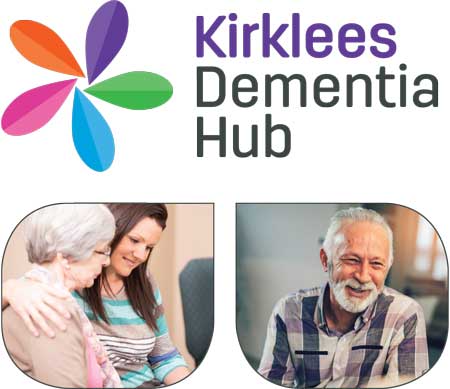Dementia support in Kirklees
Information, advice and support for people with dementia or memory loss and their carers in Kirklees.
Getting a diagnosis
If you suspect that you or someone you know is showing symptoms of dementia, you should contact your doctor as soon as possible. Your doctor may diagnose dementia or may refer you to a specialist such as the Kirklees Memory Service.
Early diagnosis can make all the difference.
Kirklees Dementia Design Guide
Download The Kirklees Dementia Design Guide produced in collaboration with University of Stirling's Dementia Services Development Centre. This guide provides practical solutions and guidance on how the dementia friendly design of places and spaces in Kirklees can enable people living with dementia to access those environments in an inclusive and equitable way.
Dementia guide
- Download our Living with dementia in Kirklees guide
Getting support

Kirklees Dementia Hub
The Kirklees Dementia Hub is a free information and advice service for people living with dementia, their carers, family and friends. It is a partnership between Kirklees Council, Community Links and Age UK Calderdale and & Kirklees.
- Kirklees Dementia Hub
- Address Age UK Calderdale & Kirklees, 12 New Street, Huddersfield, HD1 2AR
- Phone 01484503908 - Dementia information and advice line
- Opening times Monday to Friday 9am - 5pm
- Email kdh@commlinks.co.uk
- Website Age UK Calderdale & Kirklees
Spotting the signs of Dementia booklet
If you are concerned about your memory or feel that something isn't quite right about yourself or someone that you know. You can make some notes inside this booklet and take it along to a Doctor's appointment. This booklet can be used by the person experiencing symptoms themselves, a family member, a carer or an advocate.
- Download our Spotting the signs of Dementia booklet
Potential signs of Dementia
Dementia doesn't always affect the memory first, there are other signs that may cause you concern such as:
- Difficulties with vision such as judging distance, colour, contrast and reading.
- Having trouble following or joining in conversations.
- Struggling to find the right words.
- Forgetting names of family and friends or objects.
- Losing things and being unable to retrace your steps
- Poor judgment around money, for example, signing up to a door to door sales pitch when you wouldn't usually do so.
- Forgetting to pay bills
- Paying less attention to personal hygiene and grooming.
- Becoming withdrawn from things you like to do socially e.g. not going to your weekly walking group.
- Becoming confused and paranoid - changes in your mood e.g. getting more upset or angry.
- Losing track of time or place.
Everyone experiences Dementia differently and symptoms vary greatly, some may have few and others may have many of these symptoms.
Your appointment
- Contact your Doctor to book an appointment to discuss your concerns
- Ask for a longer appointment.
- Using the headings on the next page of the booklet, write down anything you feel worried about.
- Take this booklet with your notes to your Doctor appointment.
- Take notes of what your Doctor says during the appointment.
Remember
Your Doctor is there to understand and support you, before further referrals are made, they will first need to rule out any other physical reason for what you are experiencing. If you feel the changes are not improving, keep your Doctor updated and ask to see them again. If your doctor suspects that you may have Dementia they will inform you of what will happen next.